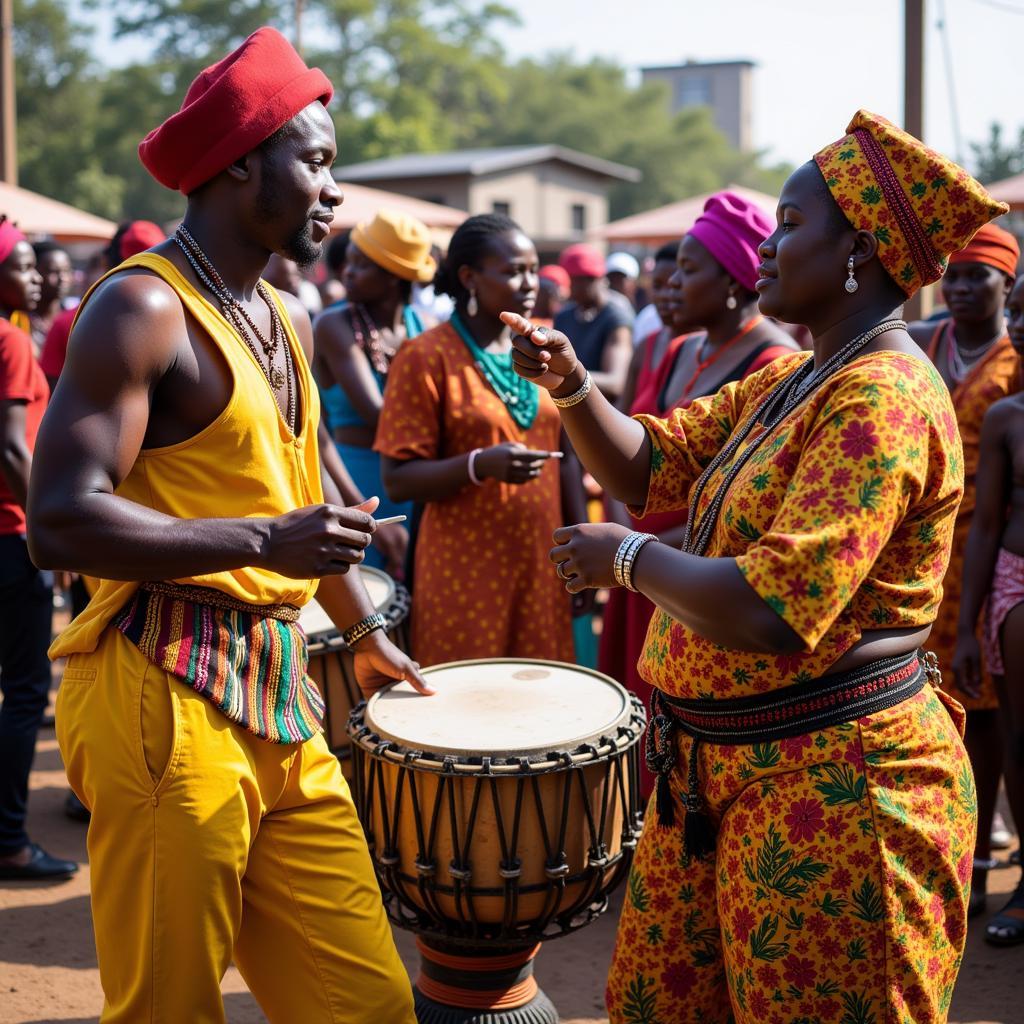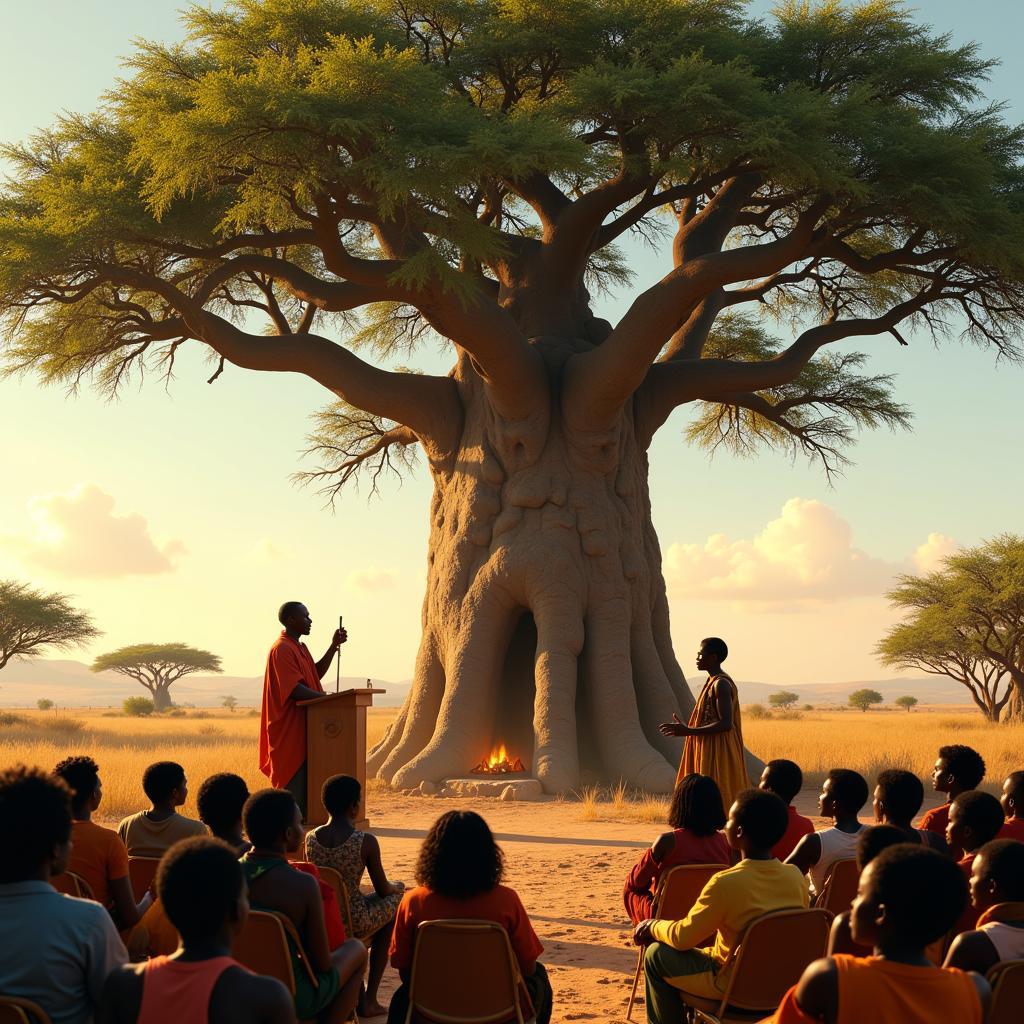Unveiling the Rich Tapestry of the African Belief System
The African Belief System is not a monolithic entity, but rather a vibrant tapestry of diverse spiritual traditions and philosophies woven together over millennia. From the arid deserts of North Africa to the lush rainforests of the Congo Basin, each region and ethnic group has developed its own unique ways of understanding the world and humanity’s place within it. This article will delve into the core principles, practices, and cultural significance of traditional African beliefs, shedding light on their enduring influence on contemporary African societies.
A Holistic View of Life: Connecting the Spiritual and the Material
At the heart of the African belief system lies a profound sense of interconnectedness. It recognizes no separation between the spiritual and physical realms, seeing them as two sides of the same coin. This holistic worldview encompasses the natural world, ancestors, deities, and the living, all existing in a delicate balance. Ancestors, revered for their wisdom and guidance, act as intermediaries between the living and the spiritual realm, offering protection, blessings, and counsel.
The Power of Community and Oral Tradition
African belief systems place a strong emphasis on community and collective responsibility. Individuals are seen as part of a larger web of relationships, extending beyond immediate family to encompass the entire community, both living and deceased. This interconnectedness fosters a strong sense of belonging and mutual support.
Oral tradition plays a crucial role in transmitting knowledge, values, and beliefs across generations. Stories, proverbs, songs, and dances serve as vessels for preserving history, teaching ethical principles, and connecting with the ancestral wisdom. Through these artistic expressions, the African belief system is kept alive and relevant in the face of changing times.
Deities and Spirits: A Pantheon of Diverse Forces
The African spiritual landscape is populated by a vast pantheon of deities, spirits, and supernatural beings. These entities represent various forces of nature, ancestral spirits, and abstract concepts, each with their own domain of influence. From the powerful sky gods to the benevolent earth spirits, these beings are believed to play an active role in the lives of humans, influencing their fortunes, health, and well-being.
Rituals and Practices: Connecting with the Sacred
Rituals and ceremonies are an integral part of the African belief system, serving as tangible expressions of faith and a means of connecting with the spiritual realm. These practices vary widely across different cultures, but often include offerings to deities and ancestors, divination, healing ceremonies, and rites of passage marking significant life events such as birth, initiation, marriage, and death.
The African Belief System in the Modern World
Despite the influence of colonialism and globalization, traditional African belief systems continue to thrive and adapt in the 21st century. Many Africans practice a syncretic approach, blending elements of their indigenous beliefs with other religions such as Christianity, Islam, and Hinduism. This fusion of traditions reflects the dynamic nature of African spirituality and its ability to evolve while retaining its core values.
Frequently Asked Questions about African Belief Systems
-
What are the most common deities in African belief systems? The answer is complex due to the diversity of African cultures. Some well-known deities include Chuku (creator god among the Igbo), Olodumare (Yoruba supreme deity), and Nyame (sky god in Akan traditions). However, each ethnic group has its own unique pantheon.
-
How are ancestors honored in African traditions? Ancestors are highly respected and their spirits are believed to guide and protect the living. They are honored through libations, offerings of food, and special ceremonies.
-
Do African belief systems have a concept of good and evil? Concepts of good and evil vary across different cultures, but most emphasize maintaining harmony within the community and with nature. Actions that disrupt this balance are considered negative.
-
How do African belief systems view death and the afterlife? Death is seen as a transition, not an end. The deceased are believed to continue to exist in the spirit world and can influence the living. Ancestor veneration is a central part of many African cultures.
-
Are African belief systems polytheistic? While some African belief systems have multiple deities, others focus on a single creator god with lesser spirits or deities. It’s important to note the diversity of beliefs within the continent.
Exploring Further
For a deeper understanding of this captivating topic, you can explore:
- A History of South African Literature to discover how African literature reflects its belief systems.
- African Language Wolof to learn about the rich linguistic diversity of the continent and how language shapes beliefs.
Conclusion: Embracing the Wisdom of the Ancestors
The African belief system offers a profound perspective on life, emphasizing interconnectedness, community, respect for nature, and the enduring legacy of ancestors. By understanding and appreciating these rich and diverse traditions, we can gain valuable insights into the human experience and our place in the world.
For any inquiries or assistance, please contact us at:
Phone Number: +255768904061
Email: [email protected]
Address: Mbarali DC Mawindi, Kangaga, Tanzania
We have a 24/7 customer service team ready to help.



